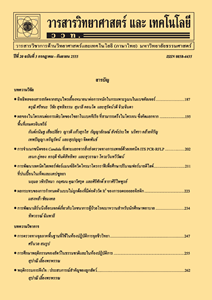การพัฒนาหลักสูตรฝึกอบรม เรื่อง ทักษะการจัดการความรู้ด้านการสร้างเสริมสุขภาพสำหรับผู้สูงวัย
Main Article Content
Abstract
บทคัดย่อ
งานวิจัยพัฒนาหลักสูตรครั้งนี้มีวัตถุประสงค์เพื่อสร้างและประเมินประสิทธิภาพของหลักสูตรฝึกอบรมทักษะการจัดการความรู้ด้านการสร้างเสริมสุขภาพสำหรับผู้วัย ดำเนินการวิจัยเป็น 3 ระยะ ระยะที่ 1 ยกร่างหลักสูตรจากการศึกษาปัญหาและความต้องการการพัฒนาทักษะการจัดการความรู้ด้านการสร้างเสริมสุขภาพของผู้สูงวัย ระยะที่ 2 นำหลักสูตรไปใช้ ระยะที่ 3 ประเมินประสิทธิผลของหลักสูตรที่สร้างขึ้น ระยะที่ 1 ศึกษาข้อมูล 2 ด้าน คือ (1) ปัญหาและความต้องการโดยการสัมภาษณ์กลุ่มตัวอย่างทั้งรายบุคคลและรายกลุ่มย่อย กลุ่มตัวอย่างเป็นผู้สูงวัยในเขตจังหวัดชลบุรีที่มีคุณสมบัติ อายุ 50 ปี ขึ้นไป จำนวน 38 คน และ (2) ข้อมูลเครือข่ายและกิจกรรมดำเนินการด้านผู้สูงอายุใน 4 จังหวัดชายฝั่งทะเลตะวันออก จากนั้นยกร่างหลักสูตรโดยพัฒนาจากฐานแนวคิดการเรียนรู้ตลอดชีวิต ชุมชนนักปฏิบัติ (Co.P) ประเมินผลผู้เรียนด้วยการประเมินผลสัมฤทธิ์ทางการเรียน ระยะที่ 2 นำหลักสูตรที่ยกร่างไปใช้โดยดำเนินการใน 2 เรื่อง (1) สร้างแบบวัดความรู้ 3 ด้าน คือ “การสร้างเสริมสุขภาพ” “การจัดการความรู้” และแบบ “ประเมินทักษะการแสดงออกของผู้นำ” ได้เครื่องมือรวบรวมข้อมูลที่มีความตรงตามเนื้อหา ค่าความเที่ยงวิเคราะห์ด้วยค่าสถิติ KR-20 เท่ากับ 0.89, 0.76 และ 0.79 ตามลำดับ (2) จัดกิจกรรมการเรียนการสอนด้วยการใช้กรณีศึกษาและผู้เรียนศึกษาจากสถานการณ์จริง หลักสูตรมีจำนวนชั่วโมงรวม 45 ชั่วโมง (บรรยาย/สัมมนา 12 ชั่วโมง สาธิตและสาธิตย้อนกลับ 9 ชั่วโมง และศึกษาดูงาน/เยี่ยมบ้าน 24 ชั่วโมง) ระยะที่ 3 ประเมินผลหลักสูตร ทั้งก่อน ระหว่าง และหลังการใช้หลักสูตรด้วยการประยุกต์ใช้แบบประเมินซิป(CIPP) โดยผู้ทรงคุณวุฒิ 3 ท่าน พบว่า วัตถุประสงค์ของหลักสูตร มีความเหมาะสม เป็นไปได้และชัดเจน ปัจจัยนำเข้า มีความพอเพียงพร้อมใช้ กระบวนการอบรม มีความราบรื่น ด้วยความร่วมมือช่วยเหลือและแก้ไขปัญหาที่เกิดขึ้นทั้งจากผู้เข้ารับการอบรมและหน่วยงานที่เกี่ยวข้อง ผลลัพธ์ของหลักสูตร พบว่าผู้เข้าอบรมมีความรู้ทักษะเพิ่มขึ้นอย่างมีนัยสำคัญทางสถิติ ระดับ 0.001 (ค่า t = 3.70, 10.78 และ 7.25 ตามลำดับ) ผู้เข้าอบรมระบุมีความพึงพอใจต่อวิธีการและกิจกรรมของหลักสูตร แสดงว่าหลักสูตรที่สร้างขึ้นครั้งนี้สามารถนำไปใช้ฝึกอบรมทักษะการจัดการความรู้ด้านการสร้างเสริมสุขภาพของผู้สูงวัย เขตจังหวัดชลบุรีได้อย่างมีประสิทธิภาพ ข้อเสนอแนะ คือ หลักสูตรควรได้มีการพัฒนาต่อเนื่อง โดยมีการนำหลักสูตรไปทดลองใช้กับกลุ่มตัวอย่างในบริบทใกล้เคียงกันต่อไป
คำสำคัญ : การพัฒนาหลักสูตร; ทักษะการจัดการความรู้; การสร้างเสริมสุขภาพผู้สูงวัย
Abstract
This study aimed to develop the training curriculum on health promotion knowledge management skills for the elders. The study divided into 3 phases; (1) construction of the curriculum (2) implementation of the curriculum, and (3) evaluation of the curriculum. Phase 1: Construction of the curriculum by assessing the participants’ needs and the needs of the community. Thirty-eight healthy elders in Chonburi Province which were identified as social well-being and acceptable, participated in the program: The curriculum was designed for 45 hrs., theory, practice, and field study, based on the concepts of life- long learning, and community of practice (Co.P) Achievement test was used as evaluation of students outcomes. Phase 2: Implementation of the curriculum. There were 2 activities; (1) construction of 3 instruments used for collecting the data; test for the knowledge on health promotion, test for the knowledge on knowledge management, and the participants self evaluation on leadership skills. These instruments were tested for content validity and the reliability analyzed by KR-20 was equal to 0.89, 0.70, and 0.79 respectively. (2) on total 45 hours of teaching and learning, case study and lesson learned from real-life situation were used on 12 hrs lecturing and seminar, 9 hrs. demonstration and return demonstration, and 24 hrs. พบว่าเมื่อทำการเพาะเลี้ยงรีคอมบิแนนท์ยีสต์ P. field study. Phase 3: Evaluation of the curriculum. CIPP model was applied for the evaluation, before, during and after curriculum implementation. For the context evaluation, the objectives were concise, feasible, and appropriated to the participants’ needs. Regarding input evaluation, the adequacy of resources and budget to support were demonstrated. However, some obstacles were shown in process evaluation. Those of them were solved by the participants and their relatives. For product evaluation, the study revealed that the learners had knowledge and skills higher than before participation in the program with statistical significance at the level of .001 (t = 3.70, 10.78, 7.25). The participants also expressed their joyful and happiness in attending the program.
Keywords: curriculum development; knowledge management skill; health promotion for the elder


